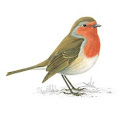I'm immersed in Paul Celan these days, and as ever I find his poetry incredibly moving, uncanny, shadowed, suggestive, and brilliant. I am scheduled to discuss his work with a doctoral student here who studies theology and philosophy, so those elements of the poems, which of course are tangled and challenging, are engaging my brain cells most prominently.
Celan is most known for his poetry of witnessing and loss, poetry that (ironically) attests to the devastating effects of the Holocaust on language and culture. But despite all of that, right now I find myself most drawn to Celan's love lyrics, even tinged as they are with this darkness. I suppose it's because the Mister and I are very in tune right now, two stones shaped and smoothed by one another and by the waters surrounding us. With this pregnancy, mysterious forces bring us together...we see one another in the same ways as ever, and in new ways: "More similar. Stranger."
In "Corona," the moon imagery, the sea imagery, the declaration of "It is time" (and, especially in combination with the other poem, the blooming stone)--they all speak to me both about waiting for this birth and being ever more in love, which probably has absolutely nothing to do with what Celan was thinking! But that's the beauty of poetry.
The Slope
~by Paul Celan
You live beside me, like me:
as a stone
in the sunken cheek of night.
Oh this slope, my love,
where we tumble incessantly,
stones,
from rivulet to rivulet.
Rounder, as time goes by.
More similar. Stranger.
And oh this drunken eye
that wanders around here the way we do
and sometimes, astonished,
sees us as one.
("Die Halde," tr. David Young)
Corona
~by Paul Celan
Autumn nibbles its leaf right from my hand: we're friends.
We shell time from the nuts and teach it to walk:
time turns back into its shell.
In the mirror is Sunday,
in dream goes sleeping,
the mouth speaks true.
My eyes goes down to my lover's loins:
we gaze at each other,
we say dark things,
we love one another like poppy and memory,
we slumber like wine in the seashells,
like the sea in the moon's blood-beam.
We stand at the window embracing, they watch from the street:
It's time people knew!
It's time the stone consented to bloom,
a heart beat for unrest.
It's time it came time.
It is time.
("Corona," tr. John Felstiner. Felstiner sees this as a response to Rilke's "Autumn Day" and "Autumn," both poems that I also love, and the latter of which I posted a few years back.)
22 February 2012
Poppy and memory
thoughts thunk by
Robin
at around
15:47
![]()
phylum or species: Poetry, the Mister
Subscribe to:
Post Comments (Atom)

No comments:
Post a Comment